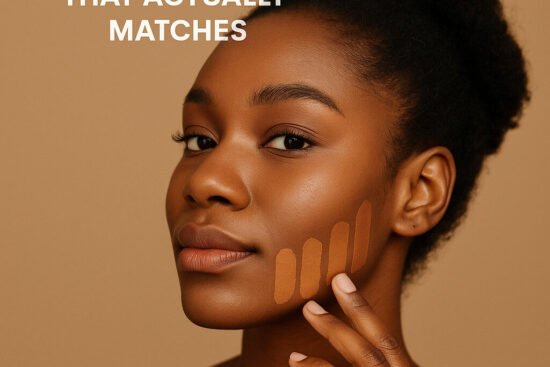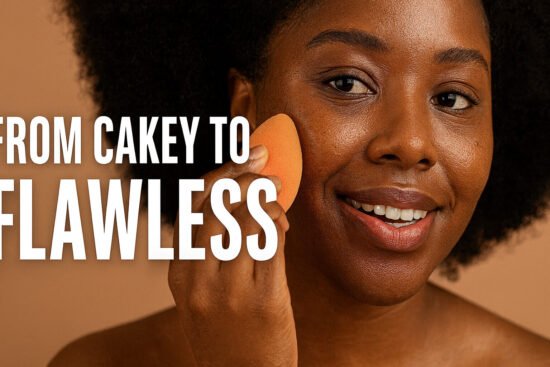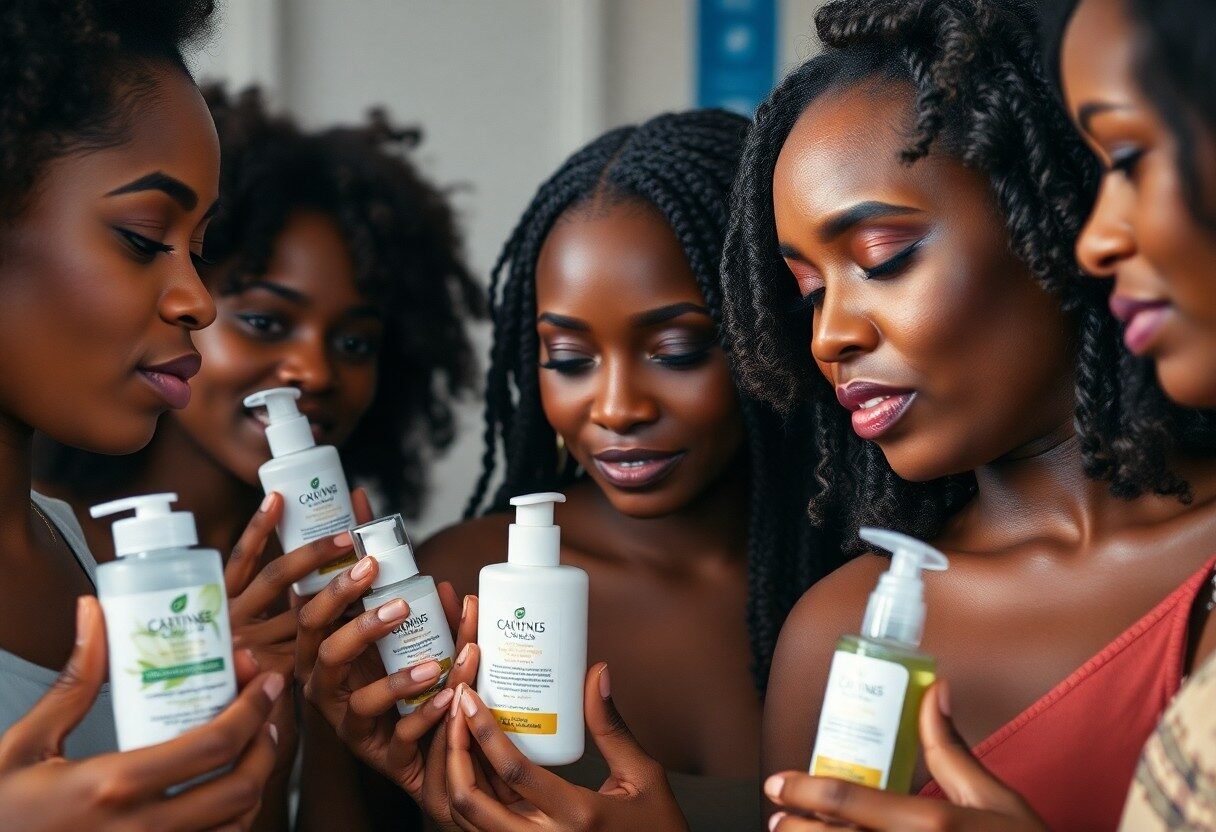
Sensitive skin can be a challenging issue, especially for Black women who often face unique skincare needs. It’s vital to choose products that not only soothe but also address your specific skin concerns, such as hyperpigmentation and dryness. In this blog post, I will share effective skincare products tailored for sensitive skin, highlighting safe and beneficial ingredients to look for and avoiding those that can cause irritation. You deserve to feel confident and beautiful in your skin, and I’m here to guide you towards the most suitable options.
Key Takeaways:
- Opt for fragrance-free products to minimize irritation and allergic reactions.
- Ingredients like aloe vera, chamomile, and calendula are soothing and beneficial for sensitive skin.
- Look for products labeled as hypoallergenic, as they are formulated to reduce the risk of allergic reactions.
- Incorporate moisturizers with ceramides and hyaluronic acid to strengthen the skin barrier.
- Patch testing new products can help identify any potential adverse reactions before full application.
- Be cautious with active ingredients like retinoids and acids; opt for gentler formulations to avoid irritation.
- Seek products specifically formulated for melanin-rich skin to address unique sensitivities and concerns.
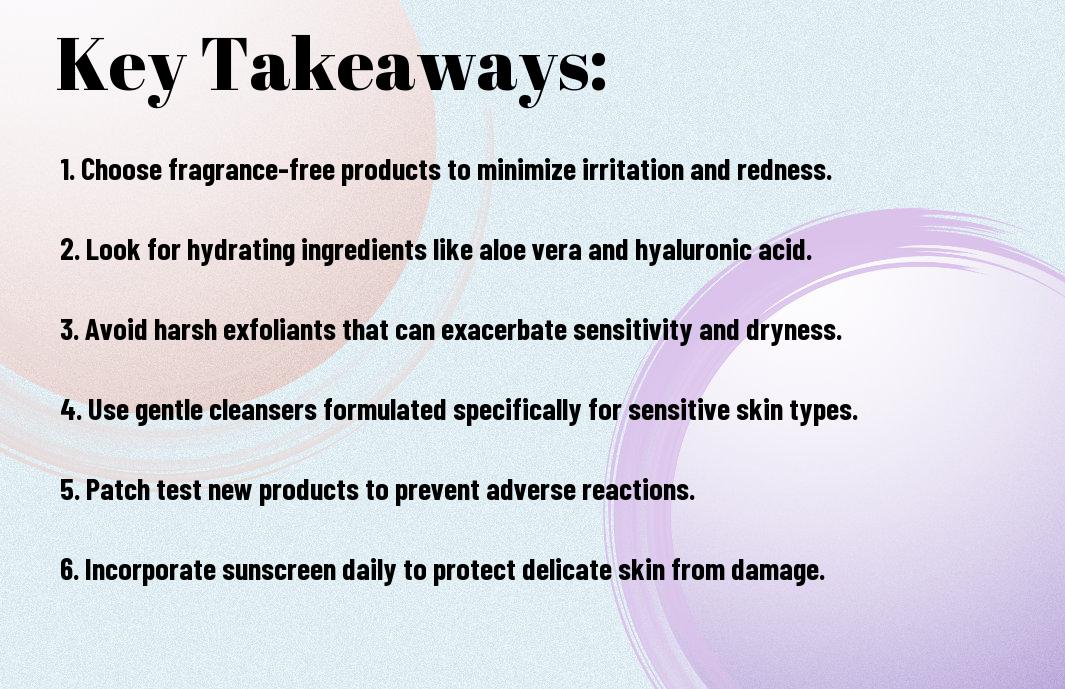
The Science of Sensitive Skin: What Sets It Apart for Black Women
Key Factors Influencing Sensitivity
Several factors play a role in determining skin sensitivity, particularly in Black women. Among these are genetics, environmental exposure, and underlying skin conditions. Genetic predisposition can heighten sensitivity, making you more susceptible to allergies. Exposure to harsh climates or pollutants can compromise your skin barrier, while conditions like eczema or rosacea can lead to increased reactivity.
- Genetics
- Environmental factors
- Skin conditions
- Products used
Recognizing these factors helps tailor a skincare regimen that addresses your unique needs.
The Role of Skin Pigmentation and Melanin
The unique composition of melanin in your skin plays a significant role in how your skin reacts to external irritants. Higher melanin levels offer some natural protection against UV radiation, which can help reduce inflammation and irritation. However, darker skin can also experience sensitivity in ways that may differ from lighter skin types, such as a higher incidence of post-inflammatory hyperpigmentation following irritation. Understanding how melanin affects your skin will guide you in selecting products that not only protect but also enhance your skin’s natural resilience.
Particularly, studies suggest that Black women often experience more pronounced reactions like pigmentation changes when using harsh ingredients or aggressive treatments. This means that selecting the right products becomes even more critical for maintaining balance. I’ve learned that milder formulations, such as those with natural botanicals, can help preserve my skin’s integrity while minimizing sensitivity. Taking care to choose products that respect my skin’s unique pigmentation allows me to enjoy healthy, glowing skin without compromising its defense mechanisms.
Common Challenges Faced by Black Women with Sensitive Skin
Environmental Stressors and Their Impact
Living in urban environments can expose your skin to various environmental stressors like pollution and harsh weather variations. Factors such as high humidity or dry air can exacerbate skin sensitivity, often leading to irritations or breakouts. When these stressors persist, they can cause your skin barrier to weaken, compromising its ability to retain moisture and protect against external irritants.
The Emotional Toll of Skin Sensitivity
Dealing with sensitive skin can take a significant emotional toll. Experiencing frequent flare-ups, discomfort, or visible signs of irritation can lead to feelings of self-consciousness, anxiety, and even depression. Your skin is a reflection of your overall well-being, and when it’s not cooperating, it can affect your confidence and daily interactions.
Your skin’s sensitivity often triggers a cycle of emotional distress. You might find yourself avoiding social situations, worried about how your skin looks or feels. This anxiety can further aggravate your skin condition, creating a frustrating loop. Seeking support from friends, family, or even therapy can be beneficial. Connecting with others who understand your experience can ease feelings of isolation and empower you to embrace your natural beauty while taking care of your skin.
Decoding Labels: What to Look For (and Avoid) in Skincare Products
Essential Ingredients for Sensitive Skin
When seeking the right skincare products, I always recommend looking for ingredients that hydrate and soothe your skin. Aloe vera, hyaluronic acid, and ceramides are fantastic choices. These ingredients not only lock in moisture but also help to restore the skin barrier. Furthermore, natural oils like jojoba and argan oil provide nourishment without clogging pores. The key is to choose formulations that prioritize gentle, yet effective components that respect your sensitive skin.
Harmful Ingredients that Can Trigger Reactions
Certain ingredients can wreak havoc on sensitive skin, leading to irritation, redness, and breakouts. Be wary of products containing fragrance, alcohol, and sulfates, as these can be particularly harsh. Synthetic dyes and parabens also pose risks, as they can disrupt the skin’s natural balance. Your skin deserves products that provide comfort rather than discomfort.
I have often encountered women who experience acute reactions due to harmful ingredients like fragrance allergens. These are hidden nasties, often included in formulations to create a pleasant scent. I advise always checking labels, as allergic reactions to such ingredients can manifest as dermatitis or eczema flare-ups, especially in sensitive skin types. Sodium lauryl sulfate (SLS), commonly found in cleansers, strips important oils, leading to dryness. For my sensitive skin routine, avoiding these triggers is the first step toward achieving a clear and balanced complexion.
Clean Beauty: The Rise of Natural and Organic Products
The Benefits of Plant-Based Ingredients for Black Women
Plant-based ingredients in skincare provide numerous benefits, especially for Black women who often deal with unique skin concerns. Ingredients like shea butter, jojoba oil, and aloe vera work harmoniously with our skin’s natural chemistry, delivering hydration and soothing properties without causing irritation. These botanical extracts are rich in vitamins and antioxidants, promoting an even skin tone and enhancing overall radiance. By choosing products infused with these elements, you can nurture your sensitive skin while minimizing the risk of adverse reactions.
Debunking Myths About Natural Products
Natural products are often misunderstood, leading to an array of myths that can deter potential users. Many believe that just because a product is labeled as “natural,” it cannot cause any skin irritation or allergies. However, even natural ingredients can trigger reactions in sensitive skin. The effectiveness of these products is also sometimes questioned, with claims that they are less potent compared to synthetic ones. Understanding these misconceptions is necessary as it allows you to make informed choices that cater specifically to your skin’s unique needs.
While it’s tempting to think that all natural products are inherently safe, it’s critical to recognize that natural does not automatically equate to hypoallergenic. For instance, necessary oils derived from plants can cause allergic reactions or irritations in some individuals. Additionally, the efficacy of natural ingredients can vary widely based on their source, processing, and formulation. Just because a product boasts a clean label doesn’t mean it’s the best fit for your sensitive skin. Evaluating each product on its individual merits rather than its classification can guide you toward the skincare that truly benefits your complexion.
Curating Your Skincare Routine: Step-by-Step Guide
| Step | Action |
| 1 | Identify your skin type and specific sensitivities. |
| 2 | Select gentle, hypoallergenic cleansers. |
| 3 | Incorporate a soothing toner or essence if desired. |
| 4 | Choose moisturizers with calming ingredients. |
| 5 | Apply sunscreen daily, even on cloudy days. |
| 6 | Consider treatment products tailored to your concerns. |
Daily Cleansing and Moisturizing Regimens
Establishing a gentle daily cleansing routine is vital for maintaining healthy skin, especially for sensitive skin. Opt for a mild, sulfate-free cleanser that doesn’t strip away natural oils. Follow this with a hydrating moisturizer rich in ingredients like hyaluronic acid and ceramides to lock in moisture. Apply a broad-spectrum sunscreen every morning; physical blockers like zinc oxide are less irritating for sensitive skin. Together, these steps will help to build a protective barrier and prevent flare-ups.
Incorporating Treatments Safely
Adding treatments to your routine can enhance your skincare regimen, but introducing new products requires caution. Always perform a patch test with any new product to ensure compatibility with your skin. Start with low concentrations of active ingredients like retinol or salicylic acid, allowing your skin to adapt gradually. Monitor your skin’s reactions and adjust usage based on how your skin feels; some products can be used a few times a week rather than daily.
It’s vital to balance treatment needs with the sensitivity of your skin. For example, if I incorporate an exfoliating product, I ensure it’s labeled as gentle and sulfate-free. Additionally, alternating treatment days can minimize irritation while still delivering results. I have found that introducing one product at a time provides insight into how your skin responds, and it allows the freedom to adjust if any adverse reactions occur. Prioritize hydration and listen to your skin’s feedback, as this personalized approach can significantly enhance your skincare journey.
Expert Recommendations: Top Brands and Products for Sensitive Skin
The Best Products for Daily Use
For daily care, I highly recommend brands like CeraVe, La Roche-Posay, and Avene. Their formulations typically contain gentle, hydrating ingredients such as ceramides and hyaluronic acid, ensuring your skin gets the moisture it craves without any irritation. For cleansing, CeraVe Hydrating Cleanser is particularly popular among users with sensitive skin due to its non-foaming, creamy texture that effectively removes dirt without stripping your skin’s natural barrier.
Targeted Treatments for Specific Concerns
For targeted treatments, options like Paula’s Choice Calm Redness Relief and The Ordinary Niacinamide 10% + Zinc 1% provide solutions for specific issues such as redness and breakouts. The formulation has soothing properties, providing relief while addressing your skin’s unique needs.
Considering specific concerns like acne or hyperpigmentation, I find that products with niacinamide and salicylic acid can be particularly beneficial. Niacinamide helps to even out skin tone and reduce the appearance of dark spots, while salicylic acid gently penetrates pores to combat acne without provoking further irritation. Incorporating these targeted treatments into your regimen allows you to address your individual skin issues effectively while still catering to your sensitive skin type.
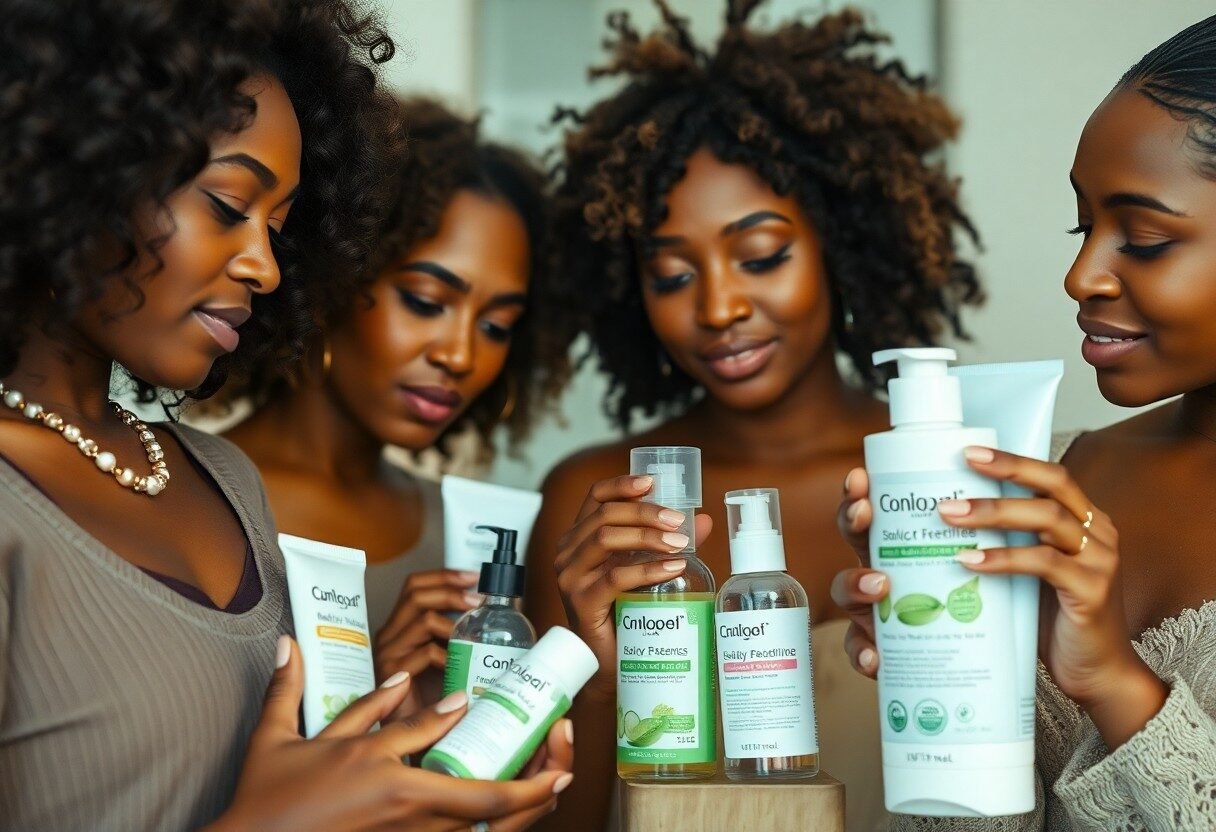
Navigating Lifestyle Choices: How Diet and Stress Impact Skin Health
Foods to Incorporate for Healthier Skin
Eating a balanced diet rich in antioxidants can significantly improve your skin’s health. I recommend incorporating vibrant fruits and vegetables like berries, spinach, and sweet potatoes into your meals. These foods are packed with vitamins C and E, which help combat free radicals and promote collagen production. Additionally, omega-3 fatty acids found in salmon and flaxseeds can help manage inflammation and keep your skin hydrated. The key lies in maintaining a colorful plate to ensure you’re getting diverse nutrients that benefit your skin.
Stress-Reduction Techniques That Make a Difference
Finding effective ways to manage stress is important for maintaining healthy skin. Techniques such as mindfulness meditation, yoga, and deep breathing exercises can help lower cortisol levels, directly impacting your skin’s appearance and resilience. Engaging in 10-20 minutes of meditation daily has shown to be particularly beneficial, as it helps calm the mind and reduce stress-related breakouts.
Exploring different stress-reduction techniques can lead to transformative changes in your skin. For instance, mindfulness practices have been shown to lower inflammation, which might otherwise manifest as redness or irritation in sensitive skin. I’ve found that setting aside time to unwind through activities like gentle yoga or simply deep breathing can create a noticeable difference. Even a walk in nature can do wonders for mood and skin health, allowing you to reconnect with yourself while also benefiting your complexion.
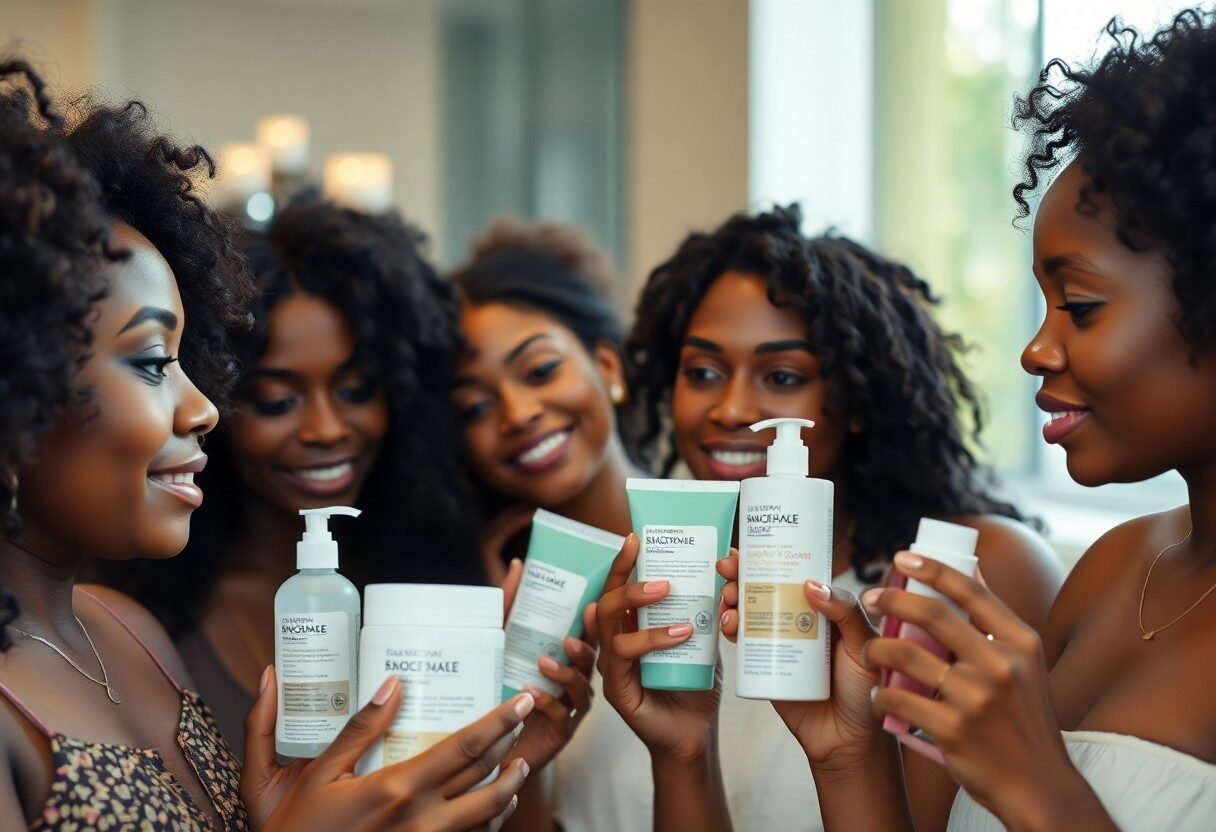
Community Insights: Voices of Black Women on Managing Sensitive Skin
Personal Stories and Recommendations
I’ve heard many Black women share their journeys with sensitive skin, often feeling frustrated when products that work for others seem to wreak havoc on their own skin. One woman found relief by switching to a gentle, fragrance-free cleanser and incorporating shea butter to hydrate her skin without irritation. Another swears by aloe vera gel for soothing breakouts and redness, noting that it’s a budget-friendly option that offers great results.
Connecting Through Shared Experiences
Building a community around our experiences can provide not only support but also valuable insights into managing sensitive skin. With social media, so many of us have found a platform to share our stories and tips, creating a collective knowledge base. I often see hashtags like #SensitiveSkinSisters, where women swap their best finds, from products to home remedies.
As more voices join this conversation, it becomes clear that we face similar challenges that deserve attention. Stories about reactions to products like *hydroquinone* or *fragrance-heavy moisturizers* resonate deeply, leading to discussions around safe alternatives. Sharing your journey can help others navigate their paths with confidence, demonstrating that we are not alone in our struggles. This connection fosters a sense of community, allowing us to learn from each other’s triumphs and challenges. Together, we can advocate for better representation and formulation in the beauty industry, ensuring that everyone’s skin needs are met with care and understanding.
Conclusion
Presently, I understand that finding the right skincare products can be a challenge, especially for Black women with sensitive skin. It’s important for you to choose gentle, hydrating, and hypoallergenic products to avoid irritation while addressing your unique skincare needs. By prioritizing ingredients that soothe and nourish your skin, you can achieve a healthy, radiant complexion. Always listen to your skin and customize your routine to ensure it remains comfortable and glowing.
FAQ
Q: What ingredients should I avoid in skincare products for sensitive skin?
A: For sensitive skin, you should avoid products containing alcohol, synthetic fragrances, parabens, sulfates, and strong exfoliants like alpha and beta hydroxy acids. These ingredients can irritate delicate skin and cause redness or breakouts.
Q: Are there specific brands that cater to the needs of Black women with sensitive skin?
A: Yes, there are several brands that focus on the skincare needs of Black women, particularly for sensitive skin. Brands like SheaMoisture, Curls, and Fenty Skin have developed product lines with gentle formulations that prioritize hydration and nourishment without causing irritation.
Q: How can I identify whether a product is suitable for my sensitive skin?
A: Look for labels that indicate ‘hypoallergenic’, ‘fragrance-free’, and ‘non-comedogenic’. Additionally, you can review the ingredient list to ensure it doesn’t contain harsh chemicals or allergens. Conducting a patch test on a small area of skin is also advisable before using a new product extensively.
Q: What type of moisturizer is best for sensitive skin?
A: A lightweight, hydrating moisturizer with calming ingredients like aloe vera, chamomile, or calendula is ideal. Look for creams and lotions that offer hydration without being overly greasy, as this can help maintain the skin barrier without causing irritation.
Q: How can I manage breakouts on sensitive skin effectively?
A: To manage breakouts on sensitive skin, use gentle cleansers and avoid harsh scrubbing. Look for acne treatments that contain salicylic acid or benzoyl peroxide in lower concentrations, as these ingredients can help reduce breakouts without irritating the skin. Consistently moisturizing and following a gentle skincare routine is also beneficial.
Q: Is it necessary to use sunscreen if I have sensitive skin?
A: Yes, using sunscreen is important for all skin types, including sensitive skin. Look for mineral-based sunscreens containing zinc oxide or titanium dioxide, as they are often less irritating than chemical sunscreens and provide protection without causing sensitivities.
Q: What are some natural remedies for soothing sensitive skin in Black women?
A: Natural remedies can include using pure aloe vera gel for its soothing properties, honey as a gentle moisturizer and antibacterial agent, and oatmeal baths to relieve irritation. Additionally, using oils such as jojoba or argan oil can help hydrate the skin without causing breakouts.









